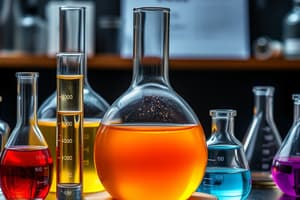Podcast
Questions and Answers
Which SI unit is used for measuring mass?
Which SI unit is used for measuring mass?
- Liters
- Kilograms (correct)
- Meters
- Seconds
What is the purpose of error analysis in scientific measurements?
What is the purpose of error analysis in scientific measurements?
- To improve the accuracy of tools
- To assess the uncertainty of measurements (correct)
- To determine the relevance of findings
- To eliminate human bias in data collection
What is a primary method through which scientists share their findings?
What is a primary method through which scientists share their findings?
- Publication in peer-reviewed journals (correct)
- Via social media platforms
- In personal blogs
- Through casual conversations
Which of the following attitudes is essential to the scientific process?
Which of the following attitudes is essential to the scientific process?
What is emphasized as a key characteristic of the scientific mind?
What is emphasized as a key characteristic of the scientific mind?
What is the first step in the scientific method?
What is the first step in the scientific method?
Which variable is manipulated by researchers in an experiment?
Which variable is manipulated by researchers in an experiment?
What distinguishes a scientific law from a scientific theory?
What distinguishes a scientific law from a scientific theory?
Why are standard units of measurements important in science?
Why are standard units of measurements important in science?
Which branch of science is primarily concerned with living organisms?
Which branch of science is primarily concerned with living organisms?
Flashcards
Scientific Method
Scientific Method
A systematic approach to understanding the natural world through observation, experimentation, and reasoning.
Independent Variable
Independent Variable
The factor that is deliberately changed or manipulated in an experiment by the researcher.
Scientific Theory
Scientific Theory
A well-substantiated explanation of some aspect of the natural world supported by a large body of evidence.
Observation (Science)
Observation (Science)
Signup and view all the flashcards
International System of Units (SI)
International System of Units (SI)
Signup and view all the flashcards
SI units
SI units
Signup and view all the flashcards
Error analysis
Error analysis
Signup and view all the flashcards
Peer-reviewed journals
Peer-reviewed journals
Signup and view all the flashcards
Scientific investigation
Scientific investigation
Signup and view all the flashcards
Critical thinking in science
Critical thinking in science
Signup and view all the flashcards
Study Notes
The Scientific Method
- Science is a systematic approach to understanding the natural world through observation, experiment, and reasoning.
- The scientific method is a framework for conducting scientific inquiry.
- Key steps in the scientific method include:
- Observation: Recognizing a phenomenon worthy of study.
- Questioning: Formulating a specific question about the observation.
- Hypothesis Formation: Proposing a testable explanation for the phenomenon.
- Prediction: Using the hypothesis to predict an outcome if the hypothesis is correct.
- Experimentation: Designing and conducting controlled experiments to test the prediction.
- Data Analysis: Evaluating and interpreting the results of the experiment.
- Conclusion: Drawing conclusions about the accuracy of the hypothesis based on the data.
- The scientific method is an iterative process.
- Experiments involve variables:
- Independent variable: The factor that is manipulated by the researchers.
- Dependent variable: The factor that is measured.
- Controlled variables: Factors that are kept constant to avoid confounding results.
- Scientific findings are often presented in a formal manner, including graphs and figures.
Branches of Science
- Science is broadly categorized into various branches, each focusing on different aspects of the natural world.
- Some major branches include:
- Physics: Studies matter, energy, and their interactions.
- Chemistry: Focuses on the composition, structure, properties, and reactions of matter.
- Biology: Explores living organisms and their processes.
- Earth Science: Investigates the Earth's structure, processes, and history.
- These branches frequently overlap and borrow knowledge from each other.
Scientific Theories and Laws
- A scientific theory is a well-substantiated explanation of some aspect of the natural world. Theories are supported by a large body of evidence and experiments.
- A scientific law describes a fundamental relationship between observable phenomena. Laws are concise statements that summarize past observations and predict future ones.
- Scientific theories and laws are not absolute; they are subject to revision in the light of new evidence.
Scientific Measurements
- Accurate measurements are critical to scientific inquiry.
- Standard units of measurements are used in science to facilitate communication and reproducibility.
- The International System of Units (SI) is the standard system for scientific measurements.
- Key SI units include meters for length, kilograms for mass, seconds for time, etc.
- Tools and techniques for measurement are crucial to the accuracy of scientific data.
- Error analysis is used in science to assess the uncertainty of measurements.
Scientific Communication
- Scientists share their work through publication in peer-reviewed journals.
- This process helps to ensure that scientific findings are credible and reliable.
- Presentations at conferences allow for discussion and feedback on the research.
Scientific Attitudes and Practices
- Critical thinking, skepticism, and objectivity are essential to the scientific process.
- Scientists must be willing to question existing theories and seek out alternative explanations.
- Openness to scrutiny and a commitment to evidence-based reasoning are key characteristics of the scientific mind.
- Scientific investigation is based upon honesty and accuracy in data collection and reporting.
Studying That Suits You
Use AI to generate personalized quizzes and flashcards to suit your learning preferences.




